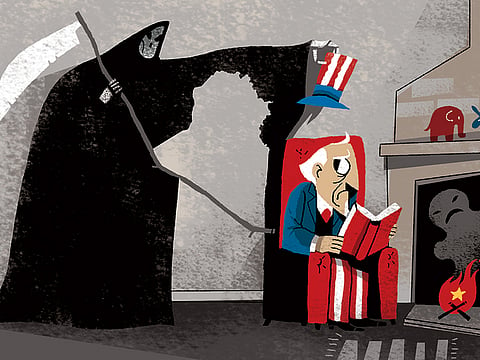The ghosts of Iraq’s future
Owing to repeated US intervention and retreat, Middle East is more dangerously riven along sectarian lines than ever

You may not be interested in war, but war is interested in you. When it comes to the 2003 US-led invasion of Iraq, Leon Trotsky’s line is apt. Much like the role Vietnam played in American politics long after US choppers had flown Saigon, the Iraq syndrome stalks US foreign policy debate. The latest victim is Jeb Bush, who last week gave four different answers to whether he would have emulated his brother had he known then what he knows now. He arrived at the correct one — “no” — three responses too late. As a display of political constipation, it was awkward to watch. Nor is the question likely to go away. Unlike Vietnam, which did not pose a direct threat to the US, Iraq remains a live challenge.
There are two important similarities with Vietnam. Iraq is a mistake that will affect US politics for a generation. George H.W. Bush proclaimed that America’s swift victory in the 1991 Gulf war had exorcised the Vietnam syndrome. Routing Iraq’s army in a 100-hour desert operation purged fears of US soldiers becoming bogged down in another nation’s jungle. In retrospect we know the first Gulf war gave birth to the second. The fact that Bush senior stopped short of toppling Saddam Hussain sowed the narrative for Bush junior to finish that job after 9/11. George W. Bush’s invasion of Iraq ran into the quicksand of urban guerrilla warfare. The terrain may have differed but the lesson was similar to Vietnam’s. It is hard to win a war when your opponent cares more about the outcome than you.
Second, Iraq has become a litmus test of a candidate’s world view. Vietnam also roiled both US parties. It converted the Democrats from the muscular internationalism of Harry Truman into a virtual citadel of peaceniks. For cycle after cycle Democratic candidates went through contortions to appear dovish to their rank and file without appearing soft on national security. The absurdly comical nadir arrived when Michael Dukakis, the liberal Democratic presidential candidate from Massachusetts, posed as a tank commander at a 1988 campaign photo op. But the legacy of Vietnam also affected hawkish Republicans. Even Ronald Reagan shied away from direct military engagements except in cases — notably Grenada in 1983 — where easy victory was assured.
In contrast to Vietnam, the political body count from Iraq is highest among Republicans. Jeb Bush is in the uniquely tough position of repudiating a war with which his brother will be eternally associated. His youthful rivals, such as Marco Rubio and Ted Cruz, can answer “no” without blinking, though it is easy to imagine both endorsing it had they been senators. The blowback from Iraq has made Republicans more cautious in general. Other than Lindsey Graham, the hardline senator from South Carolina, no Republican is flirting with putting US boots on foreign ground. In the same way post-Vietnam Democrats were twisted into pretzels when answering “hypotheticals” about future wars, Republicans are bent out of shape by Iraq. Meanwhile, Hillary Clinton, who did vote to authorise the Iraq invasion in 2002, has paid her dues. Her vote helped to deprive her of the Democratic presidential nomination to the benefit of Barack Obama. But in comparison to Jeb Bush, Hillary’s former evasions look like straight talk.
What will it take to banish Iraq syndrome? This is where it becomes complicated. On many levels, Iraq today is a security concern for the US. Despite profiting from his opposition to the Iraq invasion, Obama is now a victim. By withdrawing US forces from Iraq in 2011, Obama inadvertently helped to consolidate Iranian influence and triggered the flight of an alienated Sunni minority to the nearest strongmen. Alas, that was Daesh (the self-proclaimed Islamic State of Iraq and the Levant) — Al Qaida’s lethal offspring. Obama’s mistake was to be uninterested in Iraq. But Iraq and its neighbours were interested in him.
As a result of successive US intervention and retreat, the Middle East is more dangerously riven along sectarian lines than ever. Having promised to wind down the wars in Iraq and Afghanistan, it looks probable Obama will leave office with thousands of US military “advisers” in both countries. Iraq will likely take a keen interest in whoever replaces Mr Obama in 2017.
Bush senior was wrong. It was the Soviet Union’s 1979 invasion of Afghanistan that cured America’s Vietnam syndrome. That enabled the US to return the compliment and mire Soviet forces in an unwinnable war. There is no USSR around to clarify US foreign policy today. America’s biggest rival, China, relies far more than the US on the Middle East for its energy supply nowadays. But its footprint in the region is light — and wisely so. Daesh, and terrorism in general, pose far less of a threat to China than to the US. Only America can banish its Iraq syndrome.
The instinct in both US parties is to avoid extravagant promises regarding the Middle East. There is little electoral appetite for foreign adventurism. Nobody is credibly arguing America can transform the Arab world into a garden of democracy. US voters may no longer be interested in the Middle East. But is Daesh interested in them? If the answer is yes — and that seems probable — then Jeb Bush will have to brush up on his hypotheticals. So too will Hillary. The ghosts of Iraq are alive and well.
— Financial Times



